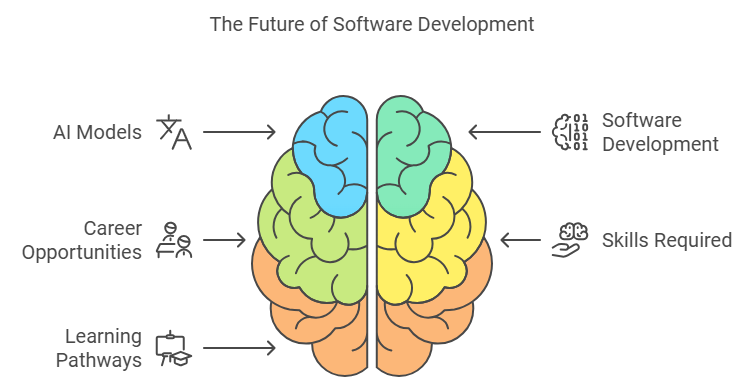Artificial Intelligence (AI) is no longer just a buzzword; it has transformed nearly every industry, especially software development. Among the many facets of AI, Prompt Engineering has emerged as a critical skill, shaping the way developers interact with AI models like ChatGPT, GPT-4, and other advanced language models.
In this article, we’ll explore what prompt engineering is, why it matters for software developers, and how transitioning to this emerging field can future-proof your career. Whether you’re a seasoned programmer or a fresh graduate looking to specialize, this guide will provide insights into why prompt engineering is the future of AI-driven development.
What Is Prompt Engineering?
Prompt engineering is the art and science of crafting effective prompts to extract the desired output from AI models. These prompts are essentially inputs in natural language, designed to guide the AI to produce specific results.
For instance, instead of coding a function in Python to sort a list, a prompt engineer might write, “Sort the following list in ascending order: [23, 5, 87, 1]” and rely on an AI model to return the answer.
While it may sound simple, mastering prompt engineering requires an understanding of:
- Natural Language Processing (NLP): Knowing how AI interprets human language.
- Model Behavior: Understanding how AI models like OpenAI’s GPT or Google’s Bard generate responses.
- Use Case Design: Tailoring prompts to achieve optimal results in diverse scenarios, from generating code to creating marketing content.
Why Is Prompt Engineering Relevant to Software Development?
Software developers are increasingly leveraging AI to speed up development cycles, reduce repetitive tasks, and create innovative applications. Here’s how prompt engineering fits into the mix:

1. Bridging the Gap Between Humans and Machines
AI models are powerful but require human input to be effective. Prompt engineers play a pivotal role in ensuring that the AI understands the developer’s intent, leading to accurate and efficient outputs.
2. Enhancing Productivity
Tasks that would traditionally take hours—like debugging code, creating API documentation, or generating test cases—can now be completed in minutes with well-crafted prompts.
3. New AI-Powered Tools
From GitHub Copilot to ChatGPT Code Interpreter, developers are adopting AI-powered tools that rely heavily on prompt engineering to optimize their workflows.
4. Shaping the Future of Development
As more organizations integrate AI into their products and services, the demand for professionals who can bridge the gap between software development and AI continues to grow.
Skills You Need to Transition Into Prompt Engineering

Making the leap from traditional software development to prompt engineering requires a blend of technical and creative skills. Here’s what you need to get started:
1. Understanding AI Models
Learn how different AI models like GPT, LLaMA, or Claude work. OpenAI and Google provide extensive documentation on their platforms, which can serve as a good starting point.
2. Natural Language Processing
Since prompt engineering revolves around crafting natural language queries, familiarity with NLP concepts is crucial.
3. Problem-Solving Skills
Effective prompt engineering involves framing problems in a way that AI can understand. This requires creativity, domain knowledge, and logical thinking.
4. Experimentation and Iteration
No single prompt works perfectly the first time. Successful prompt engineers must iteratively refine their prompts to get the best results.
5. Coding Basics
While prompt engineering minimizes the need for traditional coding, understanding programming concepts is essential for integrating AI outputs into software projects.
How to Start Learning Prompt Engineering
The good news is that transitioning to prompt engineering doesn’t require a complete career overhaul. Here’s how you can begin:
1. Use Existing AI Tools
Start by experimenting with tools like ChatGPT or GitHub Copilot. Focus on crafting prompts for tasks like generating code snippets, creating content, or analyzing data.
2. Take Online Courses
Platforms like Coursera, Udemy, and OpenAI offer specialized courses in AI and prompt engineering. Look for courses that provide hands-on projects.
3. Join AI Communities
Online communities like Reddit’s r/MachineLearning or OpenAI’s Discord server are great places to learn from experts and share knowledge.
4. Read Research Papers
Dive into the academic side of AI by exploring research papers on NLP and prompt optimization. Websites like arXiv and Google Scholar are excellent resources.
5. Build a Portfolio
Showcase your skills by creating projects that demonstrate your ability to solve real-world problems using prompt engineering.
Career Opportunities in Prompt Engineering
As AI adoption grows, prompt engineers are finding opportunities across various industries:

1. Software Development
Prompt engineering is becoming an essential skill for developers working with AI tools to build smarter applications.
2. Data Science
Data scientists can use prompt engineering to analyze datasets, create visualizations, and automate reporting.
3. Product Management
AI-powered products often rely on prompt engineers to fine-tune the interaction between users and AI systems.
4. Content Creation
Marketers and writers are increasingly using AI tools for generating content, and prompt engineering ensures high-quality output.
5. Research and Academia
Prompt engineering is a valuable skill for researchers working on cutting-edge AI models.
Challenges in Prompt Engineering
While the field is promising, it comes with its own set of challenges:
- Learning Curve: Mastering prompt engineering requires a deep understanding of AI and language models.
- Model Limitations: AI models sometimes produce inaccurate or biased results, requiring careful oversight.
- Evolving Technology: The rapid pace of AI innovation means that prompt engineers must continuously update their skills.
Prompt engineering is more than just crafting clever queries—it’s a transformative skill that bridges the gap between human intent and machine understanding. As AI continues to advance, professionals who embrace prompt engineering will find themselves at the forefront of innovation.
If you’re a software developer looking to future-proof your career, now is the perfect time to dive into the world of prompt engineering. The opportunities are vast, the tools are accessible, and the potential for growth is limitless.
Ready to make the leap? Start exploring, experimenting, and creating with AI today.


